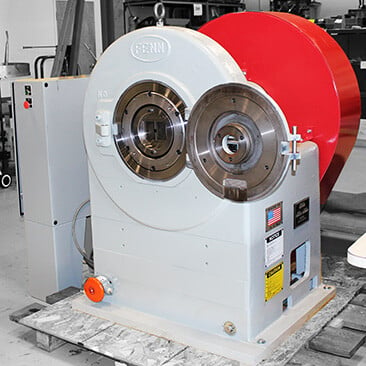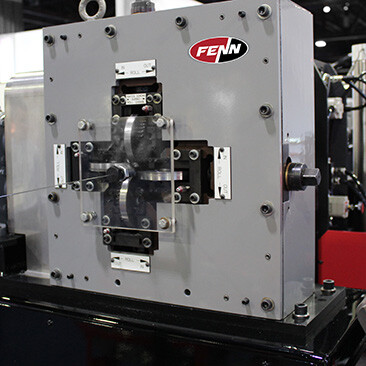Laboratory Rolling Mills for Research & Development
Using FENN Laboratory Rolling Mills for Research and Development
For over a century, FENN has been proud to offer a wide range of customized metal forming machinery to suit a variety of industries. Rolling Mills are an essential piece of equipment when conducting metallurgical research in university laboratories. FENN Rolling Mills are available in a wide range of configurations and sizes, for an assortment of engineering, manufacturing, and research and development (R&D) applications. With customizations available, FENN Rolling Mills offer flexibility and numerous benefits to universities who choose this metal forming equipment for their metallurgical applications.

Benefits of a FENN Laboratory Mill for R&D Applications
Rolling Mills are available for both hot rolling and cold rolling applications. Typically, for laboratory research, FENN Rolling Mills are capable of processing materials up to 1000 degrees Celsius. With consideration of the proper elements, FENN can design a mill to accommodate materials exceeding this temperature – Contact us to learn more.
Hot Rolling
Hot rolling is when the metal is heated to above the recrystallization temperature, this allows the material to deform on a microscopic level and take its new shape. Hot rolling is used to lower the tensile strength of a material that does not reduce well at room temperature. Heat assists in the breakdown process by making the material easier to manipulate and reduce without causing problems for the material or machine. This method ensures the material maintains its chemical microstructure and does not alter the original physical yield strength and strain properties of the metal.
Cold Rolling
Cold rolling is a metal forming process conducted at room temperature and does not require heating the metal. During the rolling process, the temperature of the metal is kept below its recrystallization temperature. Due to the work-hardening of the metal from this method, the hardness and tensile strength increase. The amount of tensile strength increase is dependent upon the type of material being rolled.
Precision strip rolling mills from FENN are engineered to meet the critical requirements of metallurgical research. FENN has a full range of Rolling Mill models with separating force capabilities from 30,000 lbs. (13.6 MT) to 1,175,000 lbs. (533 MT). FENN mills have received wide acceptance in laboratories, where precision, flexibility, and compactness are especially important. It is recognized that from a funding and floor space perspective, having both a hot and cold rolling mill at a single institution can be impractical. For this reason, FENN designs mills to handle both cold and heated materials. The engineers at FENN are prepared to work with each college and university in order to provide the customized mill suited to their requirements.
Alloys
One of the beneficial aspects of a FENN Rolling Mill is the variety of materials that can be processed. Some of the metals and metalloids that are acceptable to pass through a FENN mill for analysis and manipulation include:
- Steel
- Copper
- Lead
- Platinum
- Aluminum
- Superconducting Materials
- Exotic Metals
- Precious Metals
- Ferrous & Non-Ferrous Metals
- Engineered Materials
Furthermore, in R&D environments, a project may require the use and testing of multiple materials. The purpose of a project may be to identify the best material to use for a certain application and this can require the rolling of a variety of materials. Testing and manipulating various materials through rolling mills to see how they react to different processes can add significant insight and certainty to the research. Additional information on other materials is available upon request – call us today to learn more.
Data Acquisition
When conducting research and developing new processes, it is imperative that there be a way to accurately and confidently collect data.
An important part of R&D is the ability to accurately capture data. The data collected needs to be available in a simple and concise format in order to analyze, and possibly publish, in a timely manner. To accommodate this, FENN Lab Mills are equipped with Statistical Process Controls (SPC) that track and record data while the machine is running. The SPC systems are designed to store torque, load, speed, temperature and more, in an easy to use display. Additionally, the computer processors integrated into the mill allows customers to record “real time” data while the machine is running, which can be easily downloaded to an excel spreadsheet, tracked, viewed, and graphed for analysis.

FENN Rolling Mills Can Set Universities Apart
Engineering and materials science related fields in colleges and universities all across the country are prioritizing their resources and attention towards research and development. The need to reach a level of efficacy is paramount, as the potential to get an edge over other research institutions is the best way to gain funding, notoriety, and most importantly, reach the next level of technological innovation. By utilizing FENN’s Laboratory Rolling Mills, institutions can fully develop and understand the properties of the metals they are testing and their potential for industry needs and capabilities.
At FENN, our Rolling Mill expertise and design flexibility allow us to manufacture and customize a rolling mill to meet your research and development needs. To set yourself apart in a competitive industry, contact our team today to get started.



